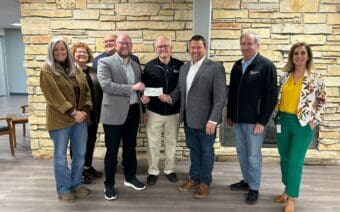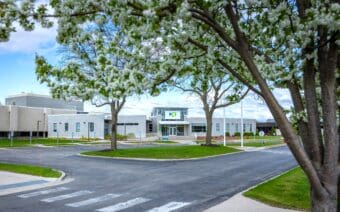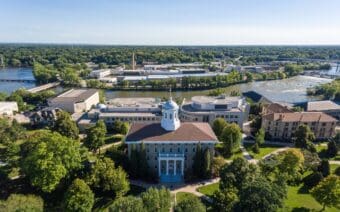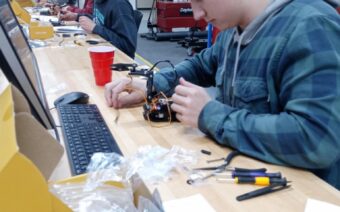
May 1, 2024
FOND DU LAC – Michelle Majewski said she has long preached the value of life-long learning – a tenet she said she has recently put to a rigorous personal test.
After a career of more than 30 years of teaching and administrating at Marian University in Fond du Lac – about half of which she said coincided with private practice in mental health care – Majewski said she retired from her then-position as dean of the School of Arts and Sciences.
Or so she thought.
Just more than a year into her retirement – and about three weeks into COVID-19 pandemic-induced lockdown measures – Majewski said she was approached to fill the then-vacant presidency at the university.
“I went from being retired and going fly-fishing in Alaska, to working 60, 70 hours a week,” she said. “It was the worst time to become a brand-new university president – and also the best time.”
Now, Majewski said, four years later she’s preparing to retire again.
One of her final contributions to the college, she said, will be aiding Marian students on their paths to life-long learning – through the successful application for $1.049 million in federal funding, which will be used to purchase new scientific equipment for the university.
Majewski said she is grateful for her colleagues’ detailed work in compiling the application.
She said community support was also a vital component, and this funding is ultimately beneficial locally and statewide.
“Making sure our students are using equipment that is currently used in the industry means they are able to step into high-paying jobs,” she said. “It’s an investment in strengthening the health and science workforce pipeline for Wisconsin, and for Fond du Lac county in particular.”
In addition to impacting employers who hire our graduates, Majewski said it also supports the general public when they seek medical or health services.
Opportunities to improve
Majewski said she’s also grateful she was sought to be president of Marian – though she said having to handle her responsibilities while working remotely was at times “overwhelming.”
“There was a pretty steep learning curve those first six months, especially with the pandemic,” she said.
Majewski said she credits the Congregation of the Sisters of St. Agnes – the university’s founding institution ¬≠- as well as the board of trustees and her administrative colleagues for helping her navigate not just theinitial challenges, but those throughout her time serving as acting president and tenure as president.
“As difficult as that was (early on), in retrospect it kind of pales in comparison to what’s happening now in higher education,” she said.

Marian University President Michelle Majewski said the new laboratory equipment and simulator mannequins purchased with the funding will be an indispensable upgrade for STEM students. Photo Courtesy of Marian University
Budget shortfalls, the effects of the “enrollment cliff,” complicated passions regarding free speech on campuses and what she said she considers a misperception regarding the value of college education, Majewski said, are among the “brutal” challenges facing not only Marian, but many universities.
Majewski said regardless of these legitimate, if often behind-the-scenes issues, her enthusiasm for the power of the classroom has never wavered – which is further supported by her pursuit to provide Marian’s health and science students an even better learning experience with new equipment.
She said she collaborated with a number of people from within the college, as well as outside the college, to apply for Congressionally Directed Spending allocated by the U.S. Department of Education.
“It really was sitting down with faculty and determining if we were to apply for this, what are the priorities for their various programs,” she said. “We really looked at it as, ‘what do we need, and how will it impact our students in a positive way?'”
Majewski said the in-depth conversations with university faculty and enrollment administration helped to determine the most vital scientific equipment for, in particular, Marian’s nursing, radiologic technology, chemistry and forensic science programs.
“You have to submit for specific equipment – it’s not just, ‘we want a chunk of money and we’ll spend it how we want,'” she said. “You have to justify it and submit an application with project details, what the goals are, the economic and community impact and who is supporting the project.”
Majewski said Marian’s application included letters of support from local law enforcement and healthcare leaders, and was formally submitted in the summer of 2023.
“We had a very well crafted application,” she said. “(Applying) takes a lot of planning and submitting the budget for the equipment. I’m really proud of our faculty for the work they did to create the document.”
An optimistic future
As pleased as she was with the application process and even though she planned to retire in summer of 2024 regardless, Majewski said the exciting potential of the funding had her anxiously awaiting any updates.
“There’s a website where you can look at what’s been submitted by communities and universities, so I was monitoring it,” she said. “Then it looked like (our application) was approved, but I thought, ‘I’m going to wait until I get confirmation on this – I don’t want to jump the gun.”
Nearly nine months after submitting the application, when Sen. Tammy Baldwin’s office confirmed Marian would receive the funding, Majewski said she was “elated.”
“And the faculty are excited,” she said. “This brings in new, state-of-the-art equipment. I believe this is the largest amount of money we’ve had in one lump sum like this in the university’s history for science equipment – and science equipment, as you might guess, is incredibly expensive.”
As Marian is a private institution, Majewski said, it does not generally receive any public funding.
“We do not receive taxpayer dollars – we are funded by student tuition – so we are very conscientious of how we spend money,” she said. “And we are also very grateful for taxpayer monies supporting equipment that we would not be able to purchase right now without the assistance of the federal government.”
Majewski said she’s also thankful for the opportunity to have applied for the funding.
“The impact across all of the students who are in our science courses is significant, so we are very appreciative of (Sen. Baldwin’s) willingness to support our request, and for congress to award us this amount of money,” she said. “Not everybody who applies gets it.”
Majewski said Marian’s faculty and administration feel a great responsibility to bolster the passionate workforces of high-demand health and science fields.
She said the new laboratory equipment and simulator mannequins purchased with the funding will be an indispensable upgrade for STEM students’ educations and occupations.
“It is up to us to make sure that we provide really well designed opportunities for students to safely use all of the equipment,” she said. “It’s really about the learning experiences – so that when they leave here they are well prepared to step into careers.”
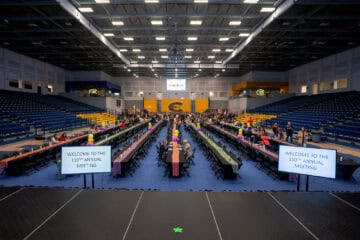 ‘It’s about being a champion, a convener and a catalyst’
‘It’s about being a champion, a convener and a catalyst’ Hsu’s Ginseng deeply rooted in Marathon County
Hsu’s Ginseng deeply rooted in Marathon County


